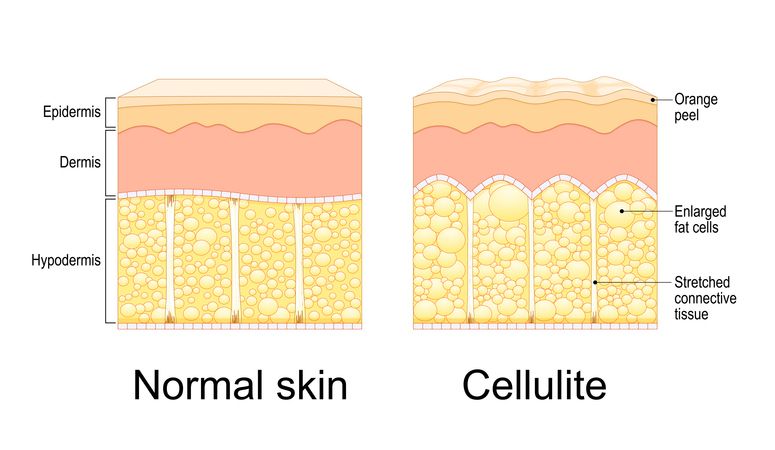Author: Natalie Ng|Updated: 30 April 2025
Your daily skincare routine might be doing more harm than good—without you even realizing it. Simple habits like over-washing your face or using the wrong products can lead to acne breakouts, especially if you have acne prone skin. These habits can strip your skin of natural oils, damage your skin’s protective barrier, and clog your pores with excess oil and dead skin cells. Other things like touching your face frequently, using dirty makeup brushes, or skipping sunscreen can increase the risk of acne flare ups and skin irritation. Even sleeping on unwashed pillowcases or forgetting to remove makeup can spread acne causing bacteria and trigger new breakouts. If you’re treating your acne but still noticing more breakouts, your skincare routine might be the reason. Understanding which habits affect your skin health is the first step to achieving clear skin and effective acne management. Keep reading to learn which everyday skincare habits might actually be causing acne—and what you can do instead to keep your skin clean and clear.

Over-Washing Your Face
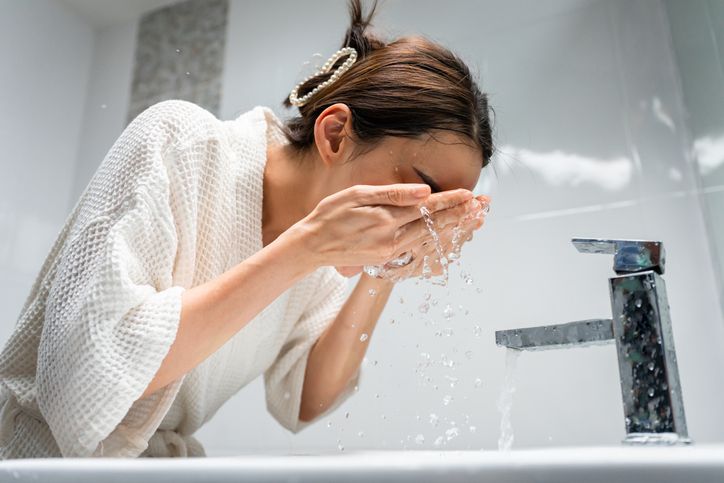
Washing your face too often can worsen acne and damage your skin barrier. It might feel like you’re keeping your skin clean, but over-washing removes natural oils that help protect your skin. Without these oils, your skin may start to produce even more oil to make up for the loss. This increase in oil production can clog your pores and lead to acne breakouts.
Over-Washing Can Irritate Acne Prone Skin
If you have sensitive skin or acne prone skin, washing more than twice a day can lead to skin irritation and more breakouts. Harsh cleansers and frequent washing break down your skin’s protective barrier, leaving it dry, red, and more likely to react to skincare products.
Keep Your Routine Simple and Gentle
To support healthy skin, wash your face no more than twice daily—once in the morning and once at night. If you sweat during the day, like after exercise, it’s okay to rinse with water or use a gentle cleanser. Use a non-comedogenic, gentle cleanser that doesn’t strip your skin. Avoid products with alcohol, strong foaming agents, or scrubbing particles.
Your goal is to keep your skin clean without removing the natural oils it needs. This helps reduce the chance of clogged pores, acne causing bacteria, and irritation that can trigger new blemishes or acne flare ups.

Touching Your Face Throughout the Day

Touching your face might seem harmless, but it’s one of the most common habits that can worsen acne and trigger breakouts. Your hands come into contact with numerous surfaces throughout the day. Each time you touch your face—whether it's brushing your hair away, resting your chin, or using your phone—you risk transferring bacteria, excess oil, and other pore-clogging substances to your skin.
How Bacteria Transfers to Your Skin
Throughout the day, your hands collect bacteria from objects like phones, keyboards, doorknobs, and money. These surfaces hold acne causing bacteria and other microorganisms. When you touch your face without washing your hands, you move this bacteria directly to areas like your cheeks, chin, and forehead. For acne prone skin, this increases the risk of new blemishes and inflammation.
Even resting your face on your hand or holding your phone against your cheek for long calls can cause breakouts. These actions expose your skin to both bacteria and heat, which can trap sweat and oil in your pores, creating a perfect environment for acne flare ups.
The Impact of Transferring Hidden Oils
Your fingers naturally carry oils, residue from skincare products, and traces of dirt picked up throughout the day. These can clog your pores and trigger more breakouts. Even if your hands look clean, they often still hold small amounts of substances that affect skin health. This can lead to clogged pores, skin irritation, and worsened acne—especially if your skin is already sensitive or inflamed.
Simple Ways to Break the Habit
To protect your skin barrier and reduce new breakouts, try keeping your hands away from your face unless they’re freshly washed. Use speakerphone or earbuds to avoid pressing your phone against your skin. Keep hand sanitizer with you and be mindful during moments when you're likely to touch your face, like during work or while studying.
These small changes support effective acne management and help keep your skin clean throughout the day.
Read More
Book Now to Experience
Acne Treatment
1 Minute Self-Registration
Date should not be before minimal date

Using Harsh Scrubs and Exfoliants
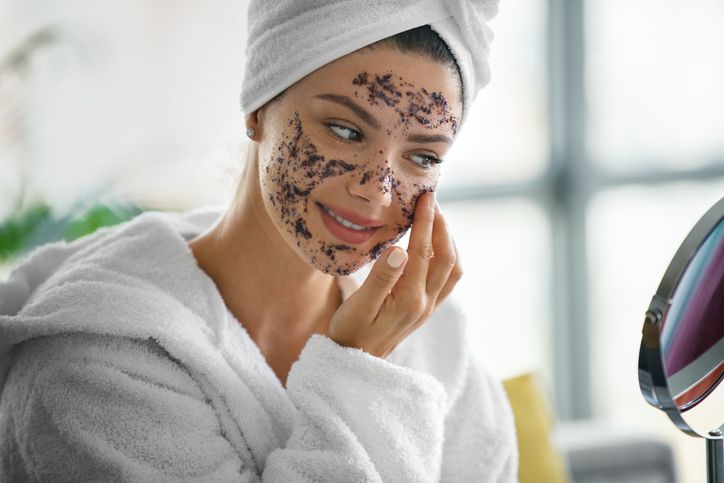
Exfoliating helps remove dead skin cells, but using harsh scrubs or exfoliating too often can damage your skin’s protective barrier. This damage triggers irritation, increases oil production, and can lead to more breakouts—especially if you already have acne prone skin or sensitive skin.
Physical Damage From Abrasive Scrubs
Rough exfoliants with large or jagged particles can create micro-tears in your skin. These small injuries weaken your skin barrier and make it easier for bacteria and environmental irritants to get in. This can lead to inflammation, clogged pores, and acne flare ups.
Your skin responds to this damage by producing more oil to protect itself. This excess oil, combined with dead skin and debris, can clog your pores and worsen acne. Even scrubs labeled for acne prone skin can be too aggressive if used too frequently or with too much pressure.
Over-Exfoliation Makes Acne Worse
Exfoliating too often strips away the natural oils your skin needs to stay healthy. Without these oils, your skin becomes dry, irritated, and more vulnerable to breakouts. Over-exfoliation can also disrupt your skin’s pH balance and increase sensitivity to other skincare products or acne treatments.
If you use exfoliants like AHAs or BHAs, limit them to 1–2 times per week. These chemical exfoliants dissolve dead cells without scrubbing and are usually better for treating your acne without physical trauma. Choose gentle, non-comedogenic products and always follow with a light moisturizer to support skin recovery and hydration.
Protecting your skin means treating it gently—especially if you're managing breakouts or using acne medication. Harsh exfoliation doesn’t lead to clear skin. It often leads to more breakouts, longer healing, and increased skin irritation.

Skipping Moisturizer
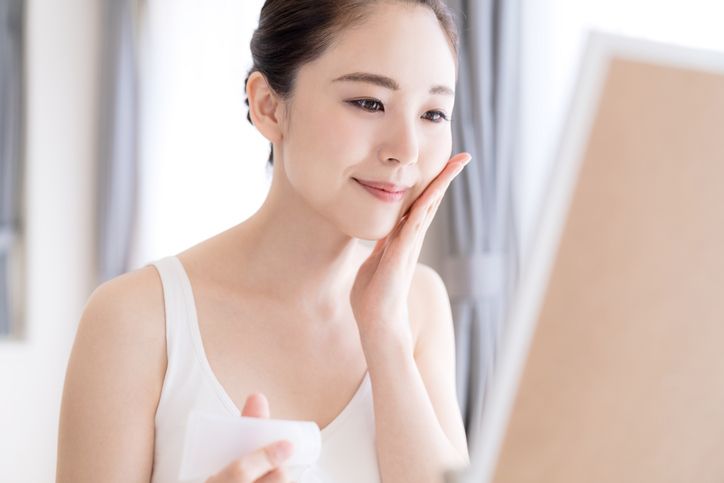
Many people with acne prone skin avoid moisturizer because they think it will clog their pores or make their skin more oily. But skipping moisturizer can actually make your acne worse. Without enough moisture, your skin produces excess oil to try to stay balanced. This can lead to clogged pores, skin irritation, and more breakouts.
Why Hydration Supports Healthy Skin
Moisturizer helps maintain your skin’s protective barrier. This barrier defends against acne causing bacteria, environmental factors, and harmful UV rays. When it’s damaged or weakened from dryness, your skin becomes more prone to inflammation, redness, and acne flare ups.
Balanced hydration also helps reduce the chance of overproduction of oil. When your skin feels dry or tight, it signals your oil glands to work harder. This increase in oil production can clog your pores and make existing acne worse.
Choosing the Right Moisturizer
Use a non-comedogenic, oil free moisturizer—something lightweight that won’t clog your pores. Ingredients like hyaluronic acid, niacinamide, and ceramides help support your skin barrier and lock in moisture without making your skin greasy.
Even if you're using acne medication or drying acne treatments, moisturizing is still important. It keeps your skin balanced and prevents irritation from becoming worse. Hydrated skin heals better and is less likely to break out.
Moisturizer is a necessary part of any skincare routine, even for oily or acne prone skin. It helps with effective acne management and supports long-term skin health.
Book Now to Experience
Acne Treatment
1 Minute Self-Registration
Date should not be before minimal date

Not Changing Pillowcases Regularly
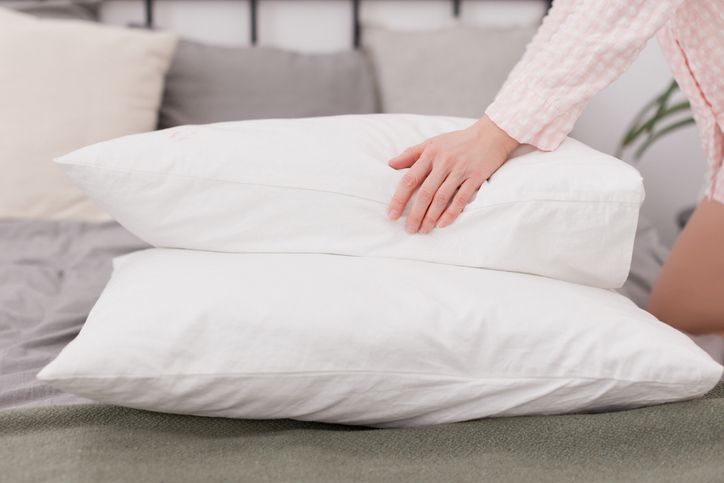
You may be following a solid skincare routine, but if you’re sleeping on a dirty pillowcase, you’re reintroducing oil, bacteria, and dead skin cells to your face every night. Over time, this buildup can clog your pores and trigger acne breakouts—especially if you have sensitive skin or acne prone skin.
How Pillowcases Collect Buildup
Your pillowcase collects everything your skin sheds during sleep—oil, sweat, dead skin, and any leftover skincare products or makeup. It also picks up residue from your hair, like oils, styling products, and even dust. All of this builds up over time and creates a surface that can transfer bacteria and grime back onto your skin.
Sleeping on the same pillowcase for days increases your skin’s exposure to acne causing bacteria and pore-clogging substances. This can make it harder to treat existing acne and may lead to new blemishes forming overnight.
How Often Should You Change Your Pillowcase?
To support clear skin, change your pillowcase at least once a week. If you have oily skin or are experiencing frequent acne flare ups, consider changing it every 2–3 days. You can also flip your pillow to the clean side between washes or place a clean towel over it as a temporary solution.
Keeping your sleeping surface clean is a simple but important part of effective acne management. It supports your skincare efforts and helps reduce the risk of clogged pores and new breakouts while you sleep.

Layering Too Many Products
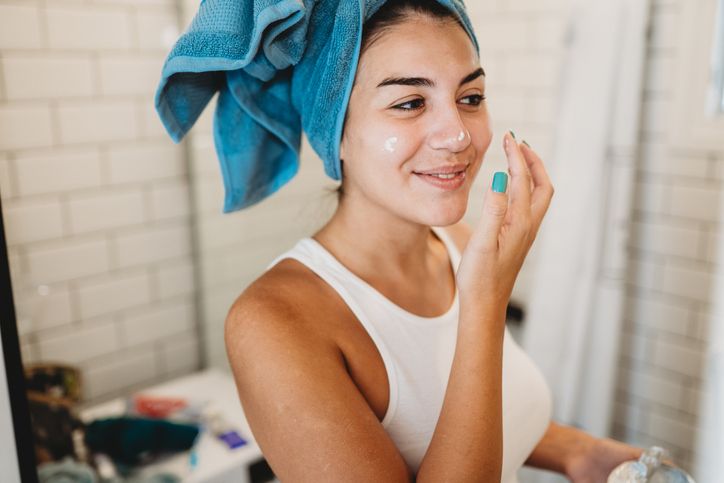
Using too many skincare products at once can overwhelm your skin and cause more breakouts. This is especially true for acne prone skin. When you apply multiple active ingredients together—like acids, retinoids, and acne treatments—they can clash, irritate your skin, and damage your skin barrier.
Too Much at Once Can Lead to Irritation
Your skin needs time to adjust to new ingredients. If you layer too many products, especially those that exfoliate or treat acne, your skin may react by becoming red, dry, or inflamed. This irritation can trigger acne flare ups and make existing acne harder to treat.
Some combinations can also cancel each other out or cause a buildup of ingredients on your skin. This can clog your pores and reduce the effectiveness of your skincare routine.
How to Simplify Your Routine
Start with the basics: a gentle cleanser, non-comedogenic moisturizer, and broad spectrum sunscreen. If you’re targeting a specific concern like breakouts or skin irritation, introduce one acne product or treatment at a time. Wait at least 1–2 weeks before adding another.
Follow the thin-to-thick rule: apply lightweight, water-based products first, then thicker creams or oils. Avoid applying multiple strong treatments in the same routine unless advised by a board certified dermatologist.
Keeping your skincare simple and focused helps protect your skin health and supports more effective acne management. Sometimes, less is more—especially if you’re trying to clear acne without making things worse.
Book Now to Experience
Acne Treatment
1 Minute Self-Registration
Date should not be before minimal date

Using Dirty Makeup Brushes and Tools
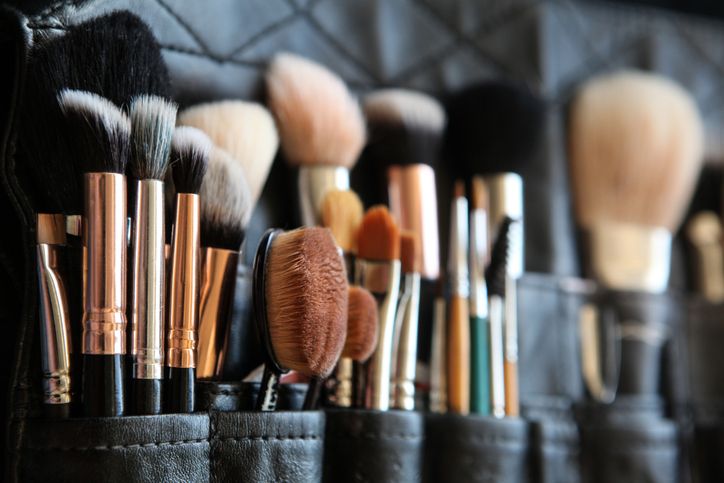
Dirty makeup brushes and tools collect oil, dead skin cells, and acne causing bacteria. Every time you use unwashed brushes, you spread these substances back onto your skin, increasing the risk of clogged pores, breakouts, and skin irritation.
How Dirty Tools Affect Acne Prone Skin
Makeup brushes come into direct contact with your skin, often over areas that already have active acne or sensitivity. If they’re not cleaned regularly, they become breeding grounds for bacteria and trapped product buildup. Using these tools repeatedly spreads bacteria across your face, which can worsen acne and trigger new blemishes—especially in people with sensitive skin or existing acne.
Sponges, especially when damp, hold even more bacteria and debris. Without frequent cleaning, they can quickly grow mold and bacteria that increase the risk of breakouts.
Cleaning Tools to Support Clear Skin
Wash your makeup brushes once a week using a gentle cleanser or mild soap. Rinse thoroughly to remove all residue and let them air dry completely. For beauty sponges, clean them after every use and replace them regularly, especially if they start to break down or smell.
Tools like jade rollers or gua sha stones should also be wiped clean with alcohol after each use to avoid bacteria transfer. Keeping all your makeup tools clean is a simple step that helps reduce acne flare ups and supports your overall skincare routine.

Picking and Popping Pimples
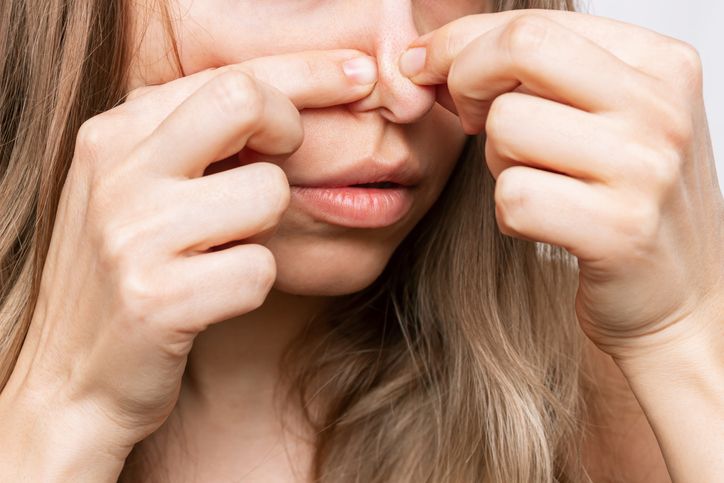
Picking at pimples or trying to pop them might seem like a quick fix, but it usually makes things worse. This habit can damage your skin, spread acne causing bacteria, and lead to more breakouts, scarring, and longer healing times.
Why Popping Pimples Backfires
When you squeeze a pimple, you apply pressure to the skin and the hair follicles underneath. Instead of clearing the pore, you often push bacteria, oil, and dead skin deeper into the skin. This causes more inflammation, which can lead to a bigger breakout or painful cystic acne.
Your fingers also carry oil and bacteria from other surfaces. When you touch your face or pick at existing acne, you're spreading those bacteria to other areas. This can create new blemishes and make current ones harder to treat.
Long-Term Damage to Skin Health
Picking at your skin breaks down the protective barrier and creates small wounds. These wounds take time to heal and can leave behind dark spots, redness, or permanent acne scars. The damage is harder to fix than the original pimple.
Instead of picking, use spot treatments with ingredients like benzoyl peroxide or salicylic acid. If a pimple is deep or painful, consider using a hydrocolloid pimple patch to reduce swelling and protect the area. For ongoing or severe acne, a board certified dermatologist can provide professional treatments that won’t cause long-term damage.
Avoiding the urge to pick is one of the most effective ways to support clear skin and reduce acne flare ups over time.
Book Now to Experience
Acne Treatment
1 Minute Self-Registration
Date should not be before minimal date

Not Removing Makeup Before Bed
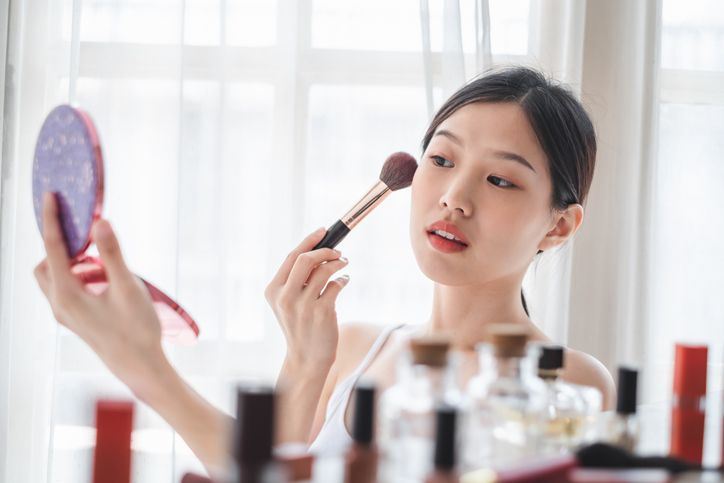
Leaving makeup on overnight traps oil, dead skin cells, and dirt on your skin. This clogs your pores and creates a breeding ground for acne causing bacteria, leading to more breakouts and irritated skin.
What Happens When You Sleep in Makeup
Your skin works to repair itself while you sleep. If your face is covered in foundation, concealer, or other makeup products, that process gets blocked. Pores stay clogged, oil builds up, and bacteria multiply overnight. This increases the chance of new breakouts, worsens existing acne, and slows healing.
Makeup also holds onto pollutants picked up throughout the day. Leaving these on your skin overnight increases the risk of inflammation and irritation, especially if you already have acne prone or sensitive skin.
How to Clean Your Skin Properly
Use a gentle cleanser to fully remove makeup before bed. If you wear heavy makeup or sunscreen, consider a double cleansing method—starting with an oil-based cleanser, followed by a water-based gentle cleanser. Make sure you’re using non-comedogenic skincare products to avoid clogging your pores during your routine.
If you're too tired to wash your face properly, makeup remover wipes are better than nothing—but use them only occasionally. They don’t fully clean your pores and may leave behind residue that affects your skin barrier.
Taking a few minutes each night to clean your face helps prevent clogged pores, supports your skin’s natural renewal process, and plays a key role in achieving clear skin.

Supporting Healthy Habits With Professional Acne Treatment
Even with the right skincare habits, stubborn acne, clogged pores, and acne scars can still be hard to manage—especially in more severe cases. That’s where professional acne treatments can make a big difference. If you’ve adjusted your skincare routine but still experience frequent acne breakouts, excess oil, or uneven texture, you may benefit from an in-clinic treatment that goes deeper than what topical skincare products can achieve.
What Is Acne Treatment?
New Beauty’s Acne Treatment uses dual spiral suction and drainage technology to exfoliate and deep-cleanse the skin. It works by removing oil, dead skin cells, and acne causing bacteria from the pores. Once the skin is cleared, a medical-grade hydrating serum is infused into the skin to balance sebum levels, reduce irritation, and support collagen production. This process improves the skin’s texture, reduces acne flare ups, and supports long-term skin health.
Why It Works
Many acne treatments like creams or exfoliants can irritate sensitive skin or worsen existing acne. This treatment avoids that by focusing on gentle, non-invasive care. It clears the pores without damaging the skin barrier, making it suitable for people with acne prone skin, sensitive skin, or persistent breakouts.
By removing deep impurities and calming sebum production, the treatment helps stop the cycle of new breakouts while improving the appearance of existing acne and scarring. This supports your skincare habits by creating a cleaner foundation for your products to work more effectively.
Benefits of the Treatment
• Removes dead skin cells and unclogs pores
• Reduces excess oil and calms inflammation
• Supports collagen production for smoother skin
• Infuses hydration to protect the skin barrier
• Minimises future breakouts by removing acne causing bacteria
• Non-invasive and painless, with no recovery time needed
If you’ve tried everything and are still dealing with stubborn acne, this treatment can complement your skincare routine and help you achieve clear skin faster.
Book your Acne Treatment today to support your skin from the inside out—clean pores, balanced oil production, and fewer breakouts start here.
New Beauty's Acne TreatmentBook Now to Experience
Acne Treatment
1 Minute Self-Registration
Date should not be before minimal date
FAQ
Can Birth Control Pills Help Reduce Acne Breakouts?
Yes, birth control pills can help manage your acne by regulating hormones that trigger excess oil production in your skin. When you take oral contraceptives containing both estrogen and progestin, they'll reduce androgen levels in your body, which often leads to fewer breakouts. You'll typically notice improvements within 3-6 months of starting the medication, but you should consult your healthcare provider to find the right option for your needs.
How Long Does It Typically Take for Acne Scars to Fade?
You'd think those stubborn acne scars would vanish as quickly as they appeared, but your skin has other plans. Breaking free from these marks typically takes 3-24 months, depending on their depth and type. Your body's natural healing process will fade red or brown spots faster (3-6 months), while deeper, pitted scars need more time (12-24 months). Don't let this journey discourage you?your skin's working hard to renew itself.
Does Drinking Water Really Improve Skin Complexion and Reduce Breakouts?
Yes, drinking plenty of water can transform your skin health! When you're well-hydrated, your body efficiently flushes out toxins and keeps skin cells plump and functioning ideally. You'll notice improved elasticity, reduced inflammation, and fewer breakouts. While water isn't a miracle cure, aim for 8 glasses daily to support your skin's natural detoxification process and maintain a clearer, more radiant complexion.
Are There Specific Foods That Trigger Acne Breakouts?
You'll find certain foods can indeed trigger those pesky breakouts. Your skin's nemesis includes dairy products, high-glycemic foods like white bread and sugary treats, and greasy fast food. You're in control though - cutting back on these triggers while embracing foods rich in omega-3s, zinc, and antioxidants can help free your skin from acne's grip.
What Hormones Are Responsible for Causing Acne in Adults?
Your hormonal acne mainly stems from androgens (like testosterone) and estrogen fluctuations. When these hormones spike, they trigger your oil glands to produce more sebum, leading to clogged pores and breakouts. If you're experiencing persistent acne, it's likely due to hormonal changes during your menstrual cycle, stress, or conditions like PCOS. You'll notice these breakouts typically appear along your jawline and chin.
Recommended Articles
COPYRIGHT© NEW BEAUTY MANAGEMENT LIMITED 2026. ALL RIGHT RESERVED.

